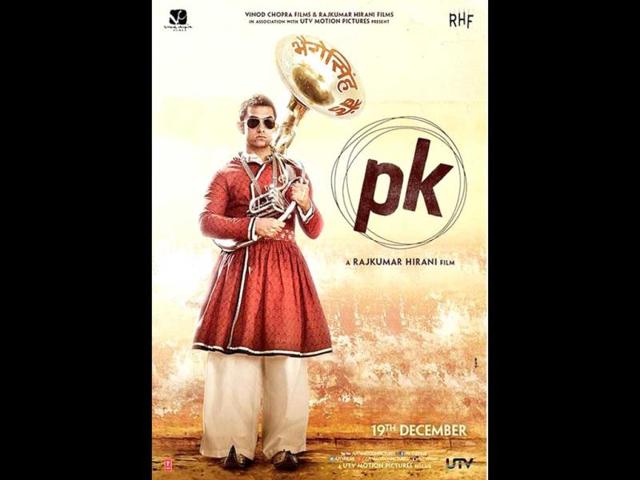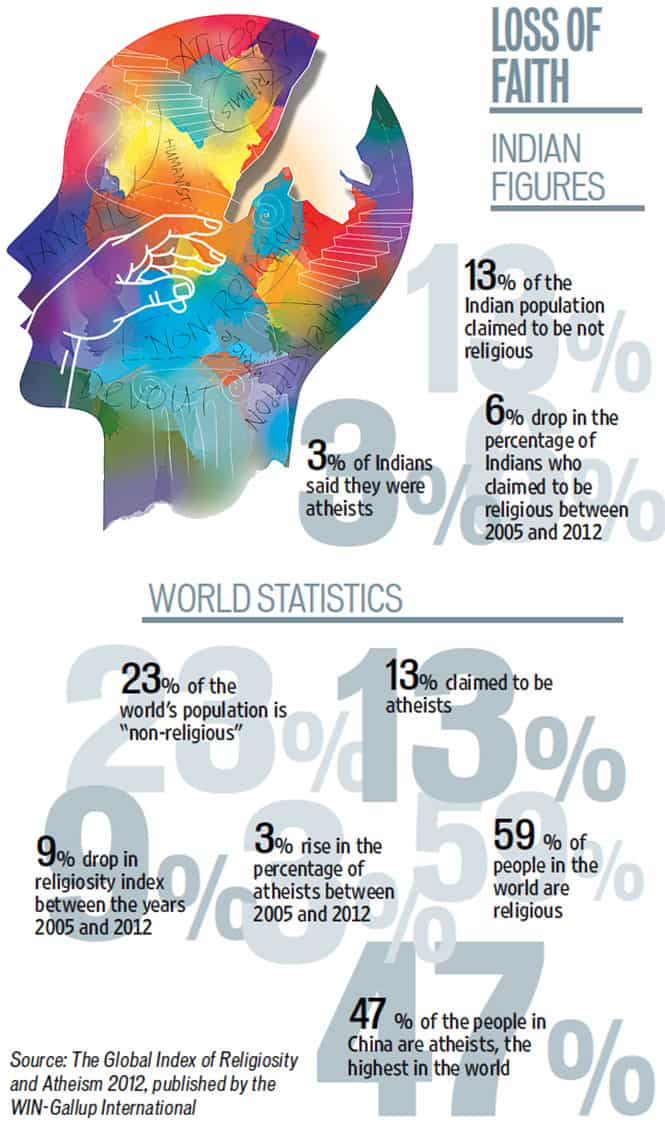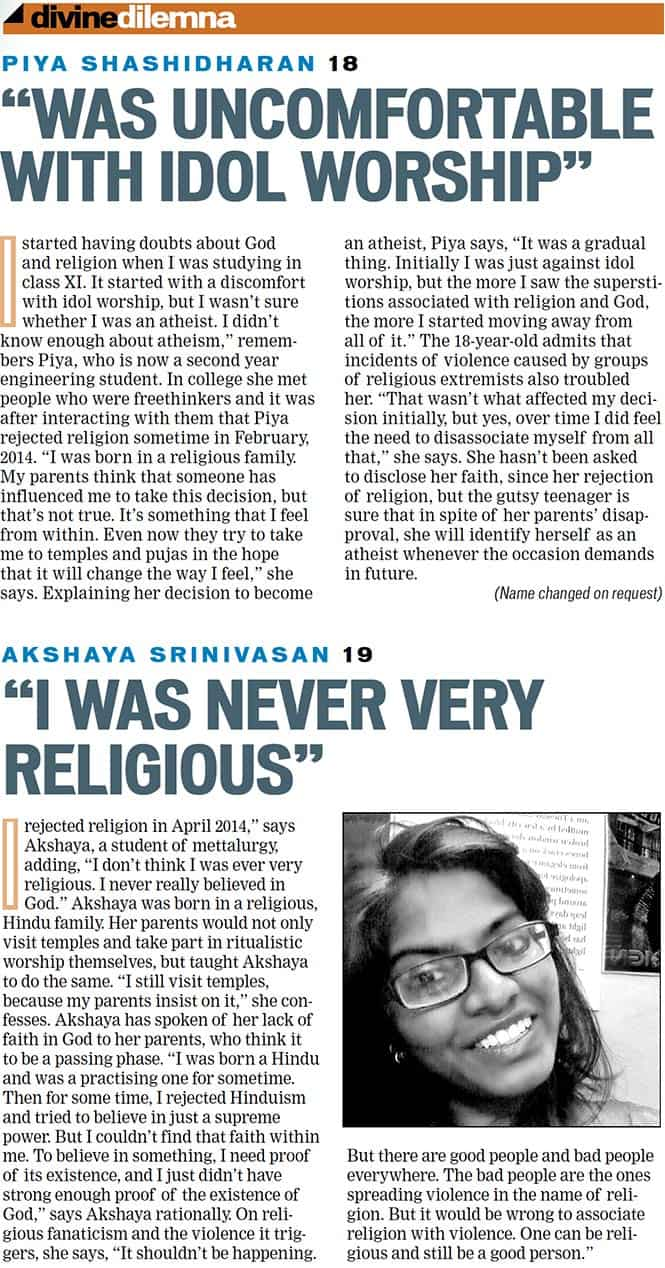No moral policing, no communal violence, please: We are Indians
Rajkumar Hirani's recent release PK, starring Aamir Khan, gave out the message that every human is born equal. But have Indians really begun to go the 'good without God' way? It sure looks like it.
In a scene from the recently-released film, PK, Aamir Khan is left clutching a single shoe belonging to his friend Sanjay Dutt, after a blast caused by religious fanatics kills him. An alien, unused to religious diversity and the accompanying conflicts on earth, Aamir wonders which creator would want his children to suffer and his belief that all religious leaders and godmen are sending our pleas to a 'wrong number' or a wrong God is strengthened. Rajkumar Hirani's film is a nice little satire on the corrupt custodians of religion and how they use the insecurities of the devout to justify their own position. It gives out the message that every human is born equal. But outside of reel reality, it has never required an alien to question dogma.

The curious or questioning mind has always challenged blind faith. Most of the religions practised today were born as breakaway factions from an existing belief. The conflict between rationalism and religion can be traced back at least to the 16th century when contrary to the church-supported belief, Nicolaus Copernicus said the Earth revolved around the sun, and not the other way round. A blow to the Adam-Eve concept of creation was dealt by Charles Darwin in the 19th century with his theory on the evolution of the species. In India, questioning God and religion has traditionally been less frowned upon, with Hinduism including within its scope various forms of non-ritualistic and imageless worship, as well as belief in nature. This was before recent cases of Hindu conservatism. That despite controversies, PK continues to run in these religiously polarised times therefore, is a measure of India's critical spirit.
"According to rough estimates, there has been a tenfold increase in the number of atheists and rationalists in the country in the past ten years," says noted rationalist Narendra Nayak. Nayak, president, Federation of Indian Rationalist Associations, an apex body of more than 65 atheist, humanist and rationalist organisations in the country, rejected God at the age of 11. "The older generation was schooled to follow conventions. Even if they didn't believe in God, they would fear to say it. This generation has had a more liberal upbringing. They have the confidence to voice their thoughts," he adds.

The Global Index of Religiosity and Atheism 2012, a report published by the WIN-Gallup International, a market research and polling organisation which works across the world, stated that 23 per cent of the world's population claimed to be "non-religious" while 13 per cent said they were atheists. The study showed that "Religiosity Index dropped by 9 per cent between 2005 and 2012. Most of the shift was not about drifting from their faith, but about claiming to be 'not religious' while remaining within the faith". There was, however, a rise of 3 per cent in atheism. The report said that 13 per cent of the Indian population was not religious while 3 per cent said they were atheists (a drop of 1 per cent from 2005). The percentage of the religious population (81 per cent) saw a drop of 6 per cent from 2005. Social scientists feel people have moved away from ritualistic practice rather than the idea of God.
"We are not talking here of atheists who are a part of Buddhism or Vedanta," clarifies social theorist Ashis Nandy, adding, "there have been no recent surveys done to document the number of those who do not believe in God in the country. Scattered studies done in the past have shown that their presence is sizeable. What has happened more recently is that with people moving across geographies and intermingling of cultures, local practices and ways of worship are being less rigidly followed. There has been a growth in those who believe in ritual-less worship."
DIVERSE PATHS
If there is no one path that leads to God or consent on ways to worship, the roads leading away from Him are also diverse. While some just choose to call themselves "not religious", those with a more defined philosophy of disbelief, identify themselves variously as agnostics, atheists, humanists or rationalists. Similar to the religious sects that they have rejected, most groups claim adherence to a single leader or the founding father of the group, whose principles guide his followers' lives. The late Gora and Saraswathi Gora, founders of the Atheist Centre near Vijayawada, the late Narendra Dabholkar in Maharashtra, who founded the Maharashtra Andhashraddha Nirmoolan Samiti, and Prabir Ghosh, president of the Science and Rationalists Association of India in eastern India, are some such leaders.
"When God is taken away, people look for an alternative and try to look for that in a leader. This results in a kind of hero-worship," admits rationalist activist Sanal Edamaruku, adding that this is a trend that has to be discouraged. "Our work is to open minds," he says. And when one rejects God, the disbelief is often passed down generations with children of rationalist parents brought up to question faith. Many of the rationalist organisations in India were started in the 20th century, though their following has grown in recent years.
DISTRUST IN THE DIVINE
In 2012, a lawyer filed a petition in a Maharashtra court requesting to be declared a"non-religious" person. The petition was struck down on the argument that religion is a personal choice, but court sanction to being "non-religious" may cause legal complications for the family. "Globally, rationalism is the third-most major faith today after Christianity and Islam. The reason for this is the Be-Rational-Be-Human campaign that we have been running for decades. Also, with increase in education, people realise that religion breeds inequality, divides people into castes, encourages superstition and results in backwardness. It is anti progress," explains Prabir Ghosh. According to Ghosh, the number of those rejecting religion in favour of reason in India is growing approximately at the rate of 10 per cent per year. For those who are neither believers nor rejectionists, being non-religious may often mean doing away with a surname (indicative of religion or caste) or non-participation in rituals.
"Religion leads to fanaticism. Especially in the past 15-20 years, incidents of violence and mass killing caused by religious extremists have been on the rise. The rational-minded are disillusioned and moving away from religion," says G Vijayam, executive director, Atheist Centre. Veteran rationalist Nayak believes moral policing by the religious-minded is one of the reasons that is pushing the young away. "Soorya Sriram, 24, was born in a religious Hindu family, but turned atheist some years back. "I saw godmen being arrested for criminal offences. I saw the grip of superstition on people and the violence committed in the name of religion and would wonder how a just God could allow this," he says.
Soorya is one of the administrators for the online page, Indian Atheists. Rid of "the baggage of dogma", atheists believe theirs is the path of the future. Most rationalists, however, insist that their struggle is against superstitions being propagated in the name of God and religion and the subsequent exploitation. Public addresses involve giving scientific and rational explanations to miracles. "We are atheists but we don't ask people to become one," says Avinash Patil of the Maharashtra Andhashraddha Nirmoolan Samity. Perhaps as a reaction to hardliners' activism to bring in people to their fold, rationalists, too, have their own band of volunteers. Indian Atheists, the online forum with approximately 26,000 members on Facebook, was born as an activist arm of Nirmukta, a group of freethinkers founded in 2008. The aim of the organisation is to "help build bridges between atheists in India and offering support to those who wish to come out". Rationalists insist that there is no similarity, even in operation and organisation, between them and the religious conservatives. "We are not indoctrinating, we are not missionaries. We are just telling people to leave behind needless rituals and enjoy life," says Edamaruku.
NUMBERS MATTER
In the land of a million Gods though, the God-less live in fear. Anti-superstition activist Narendra Dabholkar was shot dead by two youths on a motorcycle in 2013. In 2012, Edamaruku moved to Finland to avoid indefinite arrest in a blasphemy case when he stated, after investigation, that the water dripping from a crucifix in a Mumbai church, believed to be a miracle, was caused by a clogged drain.
"There should be an atmosphere of tolerance. I have seen that people, even when religious, are open to our interpretations. The godmen and religious heads are the one who feel insecure by our work," he says. Some feel the need for the presence of atheists/rationalists in policy making. "Politicians such as AK Antony, Arun Shourie, P Chidambaram and George Fernandes are atheists. But they never did anything to encourage the growth of rationalism in the country," says Nayak.
The government of India's census too does not list atheism or "no religion" as a separate category, but enumerators are instructed to record it as such under the "others" category. Revolutionary socialist Karl Marx had termed religion to be the opium of the masses. The corrupt godman in PK argues that faith in God and engagement in rituals give people the hope to survive. The battle to restore to the masses their faith in their own rationale is gathering strength, but such deep-rooted is our need to put our faith in a force greater than our own, that it might take rationalists several more decades to successfully establish who is being benefitted by this indulgence.






